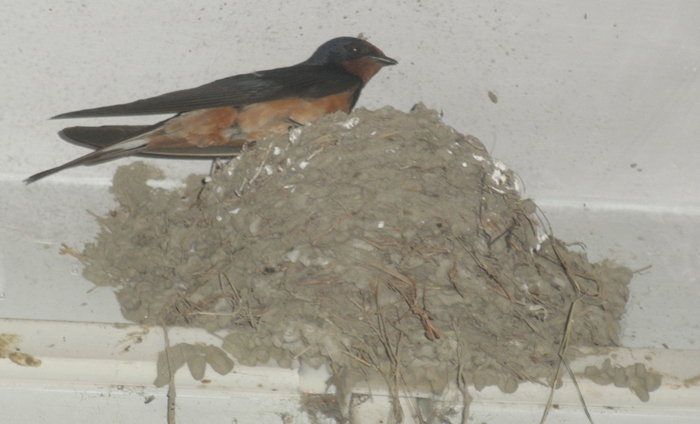I have never been a birdwatcher as I don’t find them fascinating enough to spend my time watching them. However, since some months back when a couple of birds, known as shembaang in local language, decided to build their nest at our verandah, I got accustomed to seeing them daily.
Shembaangs are a variety of swift. They are very small migratory birds. Their bluish black body appears to be black unless one is looking at them very closely. Their underside has shades of white and orange color. Its throat is however black and gives the appearance of wearing a black collar on its neck. They have a forked tail and scythe like long wings. They are very noisy birds particularly at dawn and at late evening. It is especially a wonderful sight to watch them swoop down from high up and suddenly soar up before touching the ground.
The first time when they started hovering around our verandah, I was a bit irritated with their presence as their constant chirpings were distracting me in my works. However, with time as I became more familiar with their way of life, my fascination for these small birds grew and I would often end up thinking that we human beings can learn a thing or two from these small birds.
Do not be afraid of hard works:
The amazing thing about these birds is the way they build their nest. They use straws and mud which are then cemented to the walls with the help of their saliva. They pick up these building materials in their small beak and fly back and forth many times till they finish building a nest large enough to accommodate their family. They work endlessly and can finish it in two or three days.
But if we look around us, every day we come across many people who get bogged down under pressure if they find themselves with heavy works. They become afraid of the hard works that lay ahead of them. So, they either take an easy way out and settle for something less or give up the work altogether. Its no wonder that many times persons who showed the potential of being counted among the successful people end up as a failure. At such times, it would do good to remember these small birds who are concerned only with providing a proper accommodation for their family. Like them, if we learn to focus on the goals, we will not be intimidated by any hard works. Focussing on goals help us to plan our strategy properly and priotise our works. It will also give the necessary motivation to see our works to completions.
Do not covet other’s properties:
A few days after the baby birds learnt to fly; the whole family left their nest to fly back to the place from where they came. They would return back to the nest the next year. Meanwhile a pair of shembaang began hovering in our verandah searching for a place to settle down. I was sure that this pair would use the nest which was now unoccupied. So, I was quite surprise when they started making their own new nest instead of using the empty one. It was as if they realized that the owner would need it again.
Like these swifts if we human beings learn to respect other’s properties, would there have been so many disputes, ill feelings, killings around us? Whenever we take a glance in the newspapers we are sure to come across many cases of disputes not only among individuals, but also among different states and nations who are waging wars against each others just for some piece of lands and other resources. Such fighting and disputes can only be a barrier to the developments. So, like these birds, why not be satisfied with what we have? Why desire what others possess? Isn't maintaining good relationships more important than trying to get portions of land which you might not even need?
Teach with patience:
Another impressive characteristic of shembaang is the patience with which they teach their young ones to fly. They would constantly hover around them, chirping all the time. It is as if they are saying words of encouragement to them and motivating them to fly. When the baby birds are making their maiden flight, the parent birds also fly along with them, guiding them. What is worth mentioning is that I have never seen any of the parent bird physically punish the fledging if they refuse to fly. They never peck them with their beak but would constantly chirp while flying around the nest or standing a little far away from them, encouraging the baby birds to make a move towards them.
And this is something which every teacher and parent need to learn. Whether it is the teachers at schools or the parents at home, most of them think that it is all right to punish the child if he is not making any progress with the studies. But experinces and studies have shown that the fear of physical punishments does not make the child learn any better. Instead it makes him in-confident, withdrawn and rebellious. No doubt, sometimes teaching a child can be a very frustrating experience if he or she does not show any real progress, but before physically punishing them, shouldn't we first question ourselves whether we are teaching them in the right way? Are we giving them the necessary motivations to learn? As a teacher, parent or elder when we are teaching the children we should never be very rigid in our methods of teachings. If one method doesn't show any result, don't show your frustrations on the child by giving them extreme physical punishment. Instead try to make the necessary changes in your method of teachings.
So, let us try to follow what these small birds are doing and make our life and those of others better .
Source of photo: Personal collection
